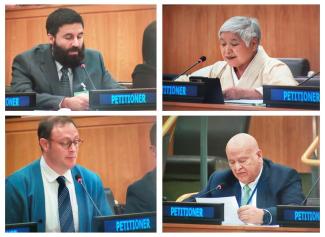International solidarity activists call on UN to enable Sahrawi people to exercise its right to self-determination and freedom

New York (UN), 15 June 2024 (SPS) - International solidarity activists have called on the United Nations to enable the Sahrawi people to exercise their right to self-determination and freedom.
This came during petitions they submitted before the thematic session of the Special Committee (Committee 24), which began its work last Monday at UN headquarters in New York.
Ms. Fumiko Hakoyama, speaking on behalf of the Friends of Western Sahara in Japan organization, recalled her visit to the Sahrawi refugee camps last year, where she was impressed by the resilience, determination, and patience of the Sahrawi people in continuing their struggle for liberation and the exercise of their right to self-determination.
She concluded her speech by emphasizing "the responsibility of the United Nations towards the issue of decolonizing Western Sahara," stressing that "it would be a shame if the international community failed to meet the legitimate demands of the Sahrawi people," calling on the Special Committee "to work to find a solution to the issue of Western Sahara without further delay."
For his part, Mr. Christopher Helali, in his capacity as international secretary of the Central Committee of the Communist Party of the United States, recalled his visits to the Sahrawi refugee camps and his attendance at the 10th Congress of the Sahrawi Youth Union and the 16th Congress of the Polisario Front.
He added that "the struggles of the Sahrawi people and the hardships they have endured for nearly half a century of war, military occupation, colonialism, ethnic cleansing, torture, and plundering of their natural resources and other violations of international law are a disgrace to the international community."
In his turn, Professor Mark Drury, in his capacity as an anthropologist and academic at Colgate University in the United States, referred to the time he spent in the occupied city of El Aaiun, where he witnessed firsthand "the level of surveillance and repression in occupied Western Sahara and the heavy Moroccan security presence, with police, soldiers, intelligence officers, and civilian informants stationed in every neighborhood, with only one goal: to suppress any public or visible expression of support for Sahrawi national sentiment."
He stressed that "the eradication of colonialism lies at the heart of the mandate of the Special Committee, and that as long as Western Sahara remains on the list of the Twenty-Four Committee, the work of the Committee remains incomplete", and called on the Committee to "do everything in its power to enable the Sahrawi people to exercise their right to self-determination".